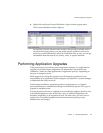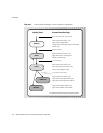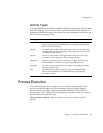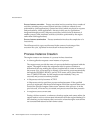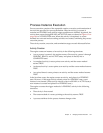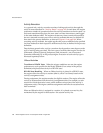
Introduction
Chapter 6 Managing Process Execution 161
If a connection is permanently lost, the client API code notifies the client
application that its connection has been permanently lost. The client application
must explicitly reopen its session to restore it to ACTIVE state. Its ability to restore
a suspended session to an ACTIVE state depends—just as with the auto-reconnect
mechanism—on the value of the session’s reconnectAction property set when the
session was first opened.
Explicitly Suspended Sessions
When a system manager explicitly suspends one or more sessions or changes the
state of a primary engine unit from ONLINE to STANDBY, all affected sessions are
automatically suspended and their corresponding client applications notified
through an event. If the engine unit (or its partner) is subsequently restored to
ONLINE state, the sessions are not automatically restored to ACTIVE state. After
sessions are explicitly suspended, the corresponding client applications must
explicitly reopen their sessions or create new sessions, depending on the values of
the reconnectAction property set when each session was originally opened.
The effect of suspending a session on any activities a client application is
performing (that is, on ACTIVE activities) depends on the suspendAction property
set by the client application when it accepts the activity. For more information, see
the description of the WFActivity method StartActivity in the iIS Process Client
Programming Guide.
Explicitly Terminated Sessions
When a system manager explicitly terminates one or more sessions, all such
sessions are automatically terminated and their corresponding client applications
are notified through an event. Termination ends sessions and deletes them from
the engine and the engine’s current state database table. After sessions are
terminated, the corresponding client applications must explicitly open new
sessions.
NOTE Terminating a session on any activities a client application is
performing (that is, on ACTIVE activities) aborts the activities. If an
activity does not have an OnAbort router to accommodate an
ABORTED state (see “Activity States” below), the engine aborts the
process instance. You should therefore undertake the termination of
sessions with caution.



